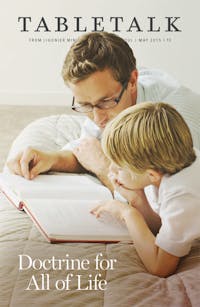
Request your free, three-month trial to Tabletalk magazine. You’ll receive the print issue monthly and gain immediate digital access to decades of archives. This trial is risk-free. No credit card required.
Try Tabletalk NowAlready receive Tabletalk magazine every month?
Verify your email address to gain unlimited access.
A case could be made that what separates Reformed believers from the rest of the evangelical church is less the competing doctrinal perspectives of Calvinism versus Arminianism and more the competing perspectives on the value of doctrine. That is, we who are Reformed, because we affirm particular doctrines, are quick to affirm that doctrine matters. This ought not surprise us, since it goes back to the start of the Reformation. When the Roman Catholic humanist scholar Erasmus wrote his Diatribe against the wisdom of Luther, he took a rather slippery stance, arguing less against any particular idea and arguing more for the wisdom of not being too particular. Luther responded in the classic The Bondage of the Will, saying, Spiritus Sanctus non est skepticus—“the Holy Spirit is not a skeptic.”
The broader evangelical church, as a general rule, is much more concerned with practical matters than theology in the abstract. In a Reformed church, for example, you may well expect to hear a seven-part sermon series on God’s eternal decrees. In a broader evangelical church, you are more likely to hear a seven-part sermon series on how to have a more joyful marriage.
It is important, of course, to have a sound and biblical understanding of God’s sovereignty over all things, to at least have a beginning understanding of His decrees. One way to get there might be seven sound sermons on His decrees. It is also important, however, to have a joyful marriage. One way to get there might be seven sound sermons on joyful marriages. We can talk about and be preached to about both of these precisely because the Bible speaks to both of these issues. These two approaches need not be at war with each other. Both have their place.
What concerns me, however, is the false dichotomy we create when we talk about doctrine and practical matters in this way. That is, it is a profoundly practical matter to understand God’s decrees. And how we have joyful marriages is deeply connected with sound doctrine. You can’t misunderstand Christ and His church while still understanding husbands and wives well (Eph. 5).
Not only, however, are doctrine and practical matters inextricably bound together, but there is another element we would do well not to forget. The Christian faith touches not just on what we think, not just on what we do, but also on how we feel. We are called to doctrinal orthodoxy, to practical orthopraxy, and to emotional orthopathos. We are called to feel rightly.
The world, of course, has a different perspective. Just as epistemological relativism affirms, “I can have my own truth and will have no one rule over my mind,” and ethical relativism affirms, “I can affirm my own right and wrong and no one shall rule over my conscience,” so emotional relativism affirms, “I can feel whatever my heart desires, and no one will rule over my feelings.” Indeed, in the world, feelings have no need for any justification. Whatever we feel, we feel. It is what it is.
We as Christians, however, are not of this world. We have another calling. The great commandment demands that we love the Lord our God not just with all our minds and with all our strength, but with all our hearts as well. Love encompasses knowing who He is. It encompasses obeying His commands. But it also is genuine emotion. A failure to love Him with all our hearts isn’t something that happens to us but is instead something of which we are guilty. Love is the only right and fitting response to His glory, for He is altogether lovely.
These three, however—our heads, our hands, and our hearts—are not just three pillars standing side by side. Rather, they are three strands of one strong cord. They are intertwined with each other, strengthening each other. The more we know about who God is, the more our heart resounds with joy.
Consider Paul as our great example. How often in his epistles does Paul find himself, as he explains some tough theological nut or unpacks a tangled concept, breaking into doxology? In the same vein, the more we love God, the more we want to know Him. Of course, the more we know Him, the more we know His law, for it is but a reflection of Him. It reveals His character, which is why the psalmist cries out to the Lord, “Oh how I love your law!” (Ps. 119:97).
The more we know Him, the more we know His law, the more we know our dependence on His grace, which should in turn redound to our gratitude and our joy. Indeed, the fullness of the fruit of the Spirit flourishes in the soil of the soul as a deeper sense of our need and His provision, which means knowing more of His law and more of His grace.
As we are called to seek first His kingdom, we would be wise to remember that the king and the kingdom are one. We are seeking Him, the express image of our heavenly Father.
Doctrine matters. Practice matters. Feeling matters. For all that we are is His. There is nothing more practical than doctrine. There is nothing more true than obedience. And there is nothing more moving than Him.
